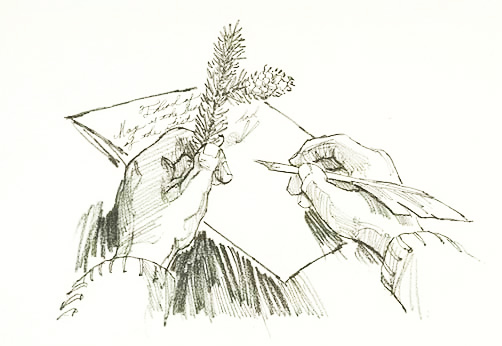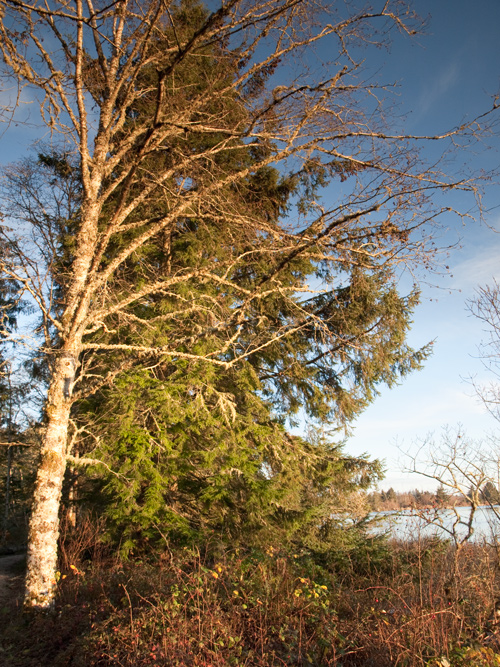In his Fort Clatsop treatise on local pines, Lewis describes a small Douglas-fir and the red alder. The enlisted men make elk jerky and leather, and they sew new clothes. Hunter George Drouillard sees the first bear out of hibernation and brings in a beaver.
A Black Bear
by Yellowstone Public Radio[1]Originally aired weekdays by Yellowstone Public Radio during the Bicentennial observance of 2003-2006. Narrated by Hal Hansen. Scripts by Whit Hansen and Ed Jacobson. Produced by Leni Holliman. © … Continue reading
Small Douglas-fir
in the marshy ground frequently overflown by the tides there grows a species of fir which I take to be the same of No. 5 which it resembles in every particular except that it is more defusely branched and not so large
—Meriwether Lewis
A Black Bear Awakens
in the evening Drewyer returned; had killed nothing but one beaver. he saw one black bear, which is the only one which has been seen in this neighbourhood since our arrival; the Indians inform us that they are abundant but are now in their holes.
—Meriwether Lewis
The Enlisted Men’s Tasks
six of our party were employed in Jerking Meat the Elk meat, and two were sent out to hunt, the remainder of our party, were employ’d at the fort, making Cloathing, moccasins & dressing Elk Skins.—
—Joseph Whitehouse
Red Alder
Alnus rubra, near Fort Clatsop
© 17 December 2010 by Kristopher K. Townsend. Permission to use granted under the Creative Commons Attribution-Share Alike 4.0 International license.
Red Alder
The stem of the black alder of this country before mentioned as arriving to great size, is simply branching and defuse. the bark is smooth of a light colour with wh[i]te coloured spreading spots or blotches, resembling much that of the beech; the leaf fructification &c is precisely that of the common alder of our country. these trees grow seperately from different roots and not in clusters or clumps as those of the Atlantic states.
—Meriwether Lewis
Weather Diary
aspect of the weather at rise
Wind at rise
aspect of the weather at 4 OC1 P.M. Wind at 4 O’Clock P.M. cloudy after rain &hail S w cloudy after rain & hail S. W. principally rain which has fallen.
—Meriwether Lewis[2]To assist the reader, the editor of this web page has omitted the “Day of ye Month” column and spelled out some abbreviations.
Experience the Lewis and Clark Trail
The Lewis and Clark Trail Experience—our sister site at lewisandclark.travel—connects the world to people and places on the Lewis and Clark Trail.
Plan a trip related to February 9, 1806:

Fort Clatsop is a High Potential Historic Site along the Lewis and Clark National Historic Trail managed by the U.S. National Park Service. The site is managed by the Lewis and Clark National and State Historic Parks.
Notes
| ↑1 | Originally aired weekdays by Yellowstone Public Radio during the Bicentennial observance of 2003-2006. Narrated by Hal Hansen. Scripts by Whit Hansen and Ed Jacobson. Produced by Leni Holliman. © 2003 by Yellowstone Public Radio. |
|---|---|
| ↑2 | To assist the reader, the editor of this web page has omitted the “Day of ye Month” column and spelled out some abbreviations. |




